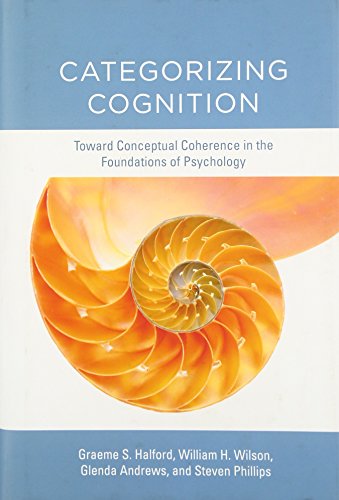All books / Book
Categorizing Cognition: Toward Conceptual Coherence in the Foundations of Psychology (The MIT Press)

| Full title: | Categorizing Cognition: Toward Conceptual Coherence in the Foundations of Psychology (The MIT Press) |
|---|---|
| ISBN: | 9780262028073 |
| ISBN 10: | 0262028077 |
| Authors: | Phillips, Steven Halford, Graeme S. Andrews, Glenda Wilson, William H. |
| Publisher: | The MIT Press |
| Edition: | Illustrated |
| Num. pages: | 376 |
| Binding: | Hardcover |
| Language: | en |
| Published on: | 2014 |
Read the reviews and/or buy it on Amazon.com
Synopsis
All Sciences Need Ways To Classify The Phenomena They Investigate; Chemistry Has The Periodic Table And Biology A Taxonomic System For Classifying Life Forms. These Classification Schemes Depend On Conceptual Coherence, Demonstrated Correspondences Across Paradigms. This Conceptual Coherence Has Proved Elusive In Psychology, Although Recent Advances Have Brought The Field To The Point At Which It Is Possible To Define The Type Of Classificatory System Needed. This Book Proposes A Categorization Of Cognition Based On Core Properties Of Constituent Processes, Recognizing Correspondences Between Cognitive Processes With Similar Underlying Structure But Different Surface Properties. These Correspondences Are Verified Mathematically And Shown Not To Be Merely Coincidental. The Proposed Formulation Leads To General Principles That Transcend Domains And Paradigms And Facilitate The Interpretation Of Empirical Findings. It Covers Human And Nonhuman Cognition And Human Cognition In All Age Ranges. Just As The Periodic Table Classifies Elements And Not Compounds, This System Classifies Relatively Basic Versions Of Cognitive Tasks But Allows For Complexity. The Book Shows That A More Integrated, Coherent Account Of Cognition Would Have Many Benefits. It Would Reduce The Conceptual Fragmentation Of Psychology; Offer Defined Criteria By Which To Categorize New Empirical Results; And Lead To Fruitful Hypotheses For The Acquisition Of Higher Cognition. -- Publisher's Description. Introduction And Statement Of The Problem -- Properties Of Cognitive Processes -- Relational Knowledge In Higher Cognition -- Cognitive Complexities And Correspondences -- Representational Rank -- Acquisition Of Relational Knowledge And The Origin Of Symbols -- Neural Nets As Models Of Acquisition Processes -- Human Reasoning And Relational Knowledge -- Applications Of Relational Knowledge Theory -- Conclusion. Graeme S. Halford, William H. Wilson, Glenda Andrews, And Steven Phillips. Includes Bibliographical References And Index.